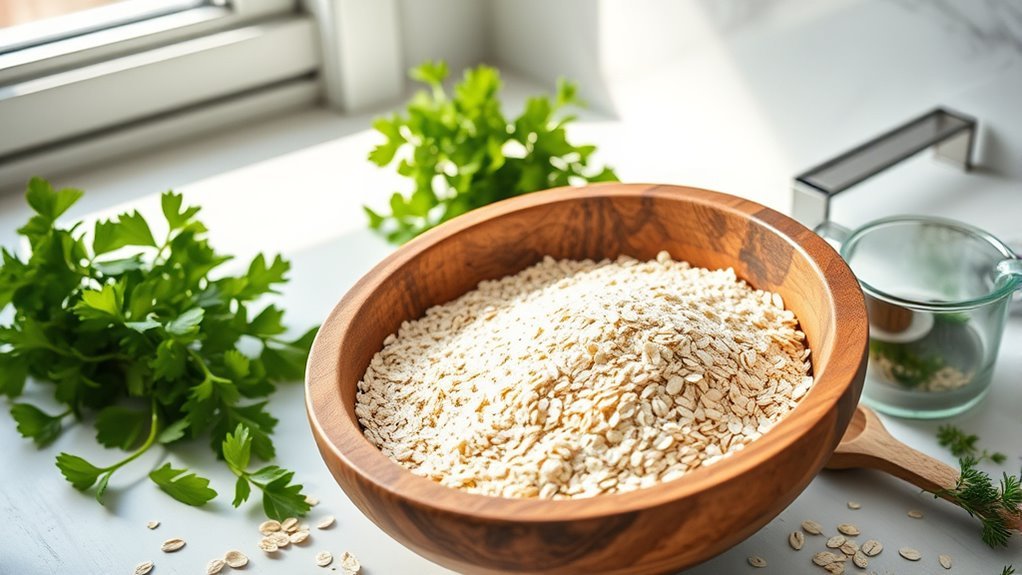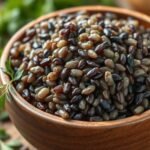Yes, oat fiber is considered keto-friendly. It offers a high fiber content with only 11g of net carbs per 100g, making it a great addition to your low-carb diet. The soluble and insoluble fibers support digestive health and help regulate blood sugar levels, which is essential for maintaining ketosis. You can easily incorporate oat fiber into your meals for added texture and satiety. To learn more about its benefits and how to use it effectively, keep going.
Understanding Oat Fiber: What Is It?
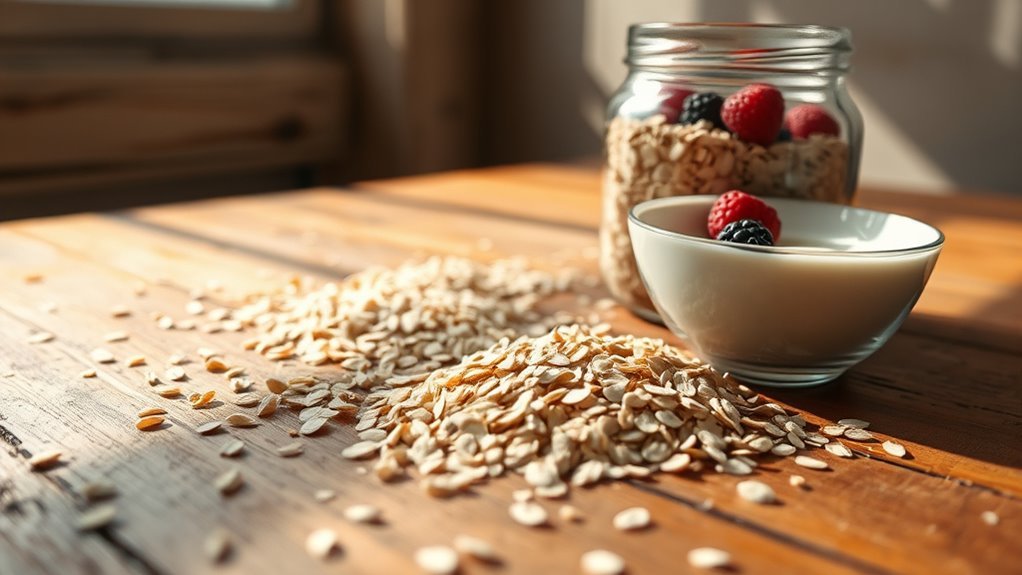
Oat fiber is a unique ingredient derived from the outer husk of oats, and it’s gaining attention in the health and wellness community. Its origins trace back to ancient cultures that recognized oats for their nutritional benefits. Today, oat fiber is widely used in various food products, especially as a functional ingredient in baked goods, cereals, and supplements. Its high fiber content serves to improve texture, enhance moisture retention, and boost satiety, making it a popular choice among those looking to manage their weight or improve gut health. You’ll find oat fiber in gluten-free options, as it adds bulk without the need for wheat. Understanding its uses can empower you to make informed choices about your dietary options.
Nutritional Profile of Oat Fiber
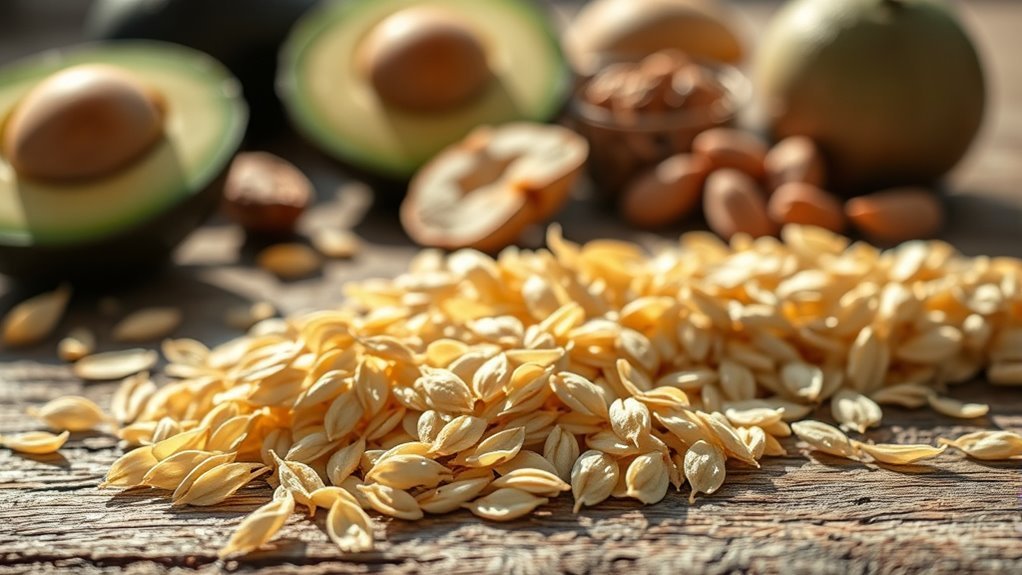
The nutritional profile of oat fiber makes it a valuable addition to many diets. Rich in soluble and insoluble fiber, it supports digestive health and helps maintain steady blood sugar levels. Oat fiber benefits include its potential to lower cholesterol and promote a feeling of fullness, which can aid in weight management. You can find oat fiber sources in products like oat bran, whole oats, and specialized oat fiber supplements. Incorporating these sources into your meals can enhance your dietary fiber intake without noticeably increasing calories. This makes oat fiber a great option for those seeking to improve their overall nutrition while enjoying the freedom of diverse food choices. Embracing oat fiber can lead to a healthier, more balanced lifestyle.
Carbohydrate Content and Net Carbs
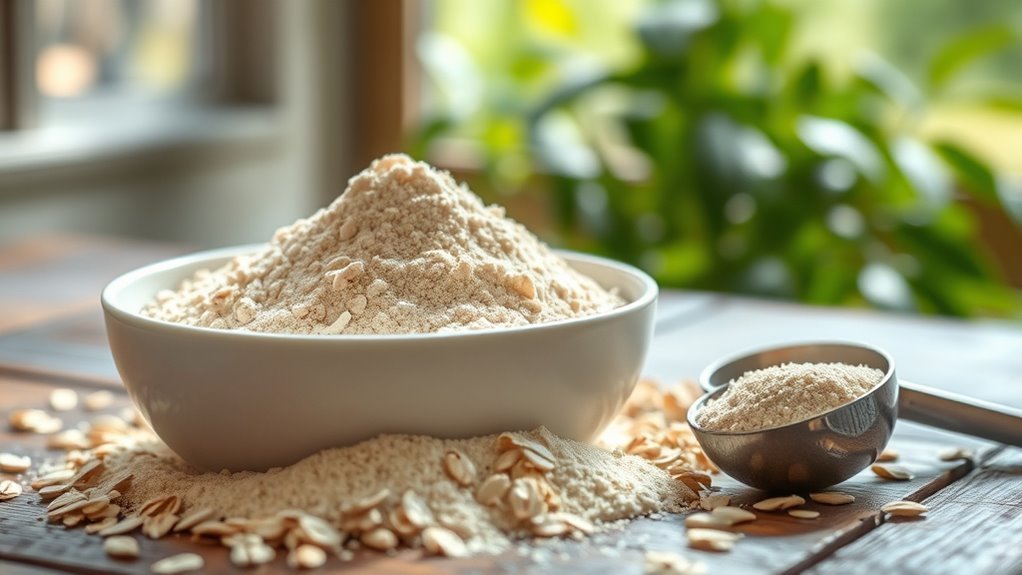
While considering a keto diet, it is essential to examine the carbohydrate content of ingredients like oat fiber. Oat fiber is mainly made up of soluble and insoluble fiber types, which impact its net carb count. Here’s a breakdown of its carbohydrate content:
| Component | Amount per 100g |
|---|---|
| Total Carbohydrates | 87g |
| Dietary Fiber | 76g |
| Net Carbs | 11g |
Due to its high fiber content, oat fiber has excellent keto compatibility. The net carbs, which are the total carbs minus fiber, are relatively low, making it a suitable option for those following a ketogenic lifestyle. Understanding these figures can help you make informed choices while maintaining your carb limits. Additionally, focusing on net carbs allows for more food freedom and enhances the keto experience.
The Role of Fiber in a Keto Diet
Fiber plays an important role in a keto diet, impacting your overall health and digestion. Understanding the difference between soluble and insoluble fiber can help you optimize your fiber intake while maintaining ketosis. Additionally, the right balance of fiber can influence your body’s ability to stay in a state of ketosis, making it essential to take into account its effects carefully.
Importance of Dietary Fiber
Understanding the importance of dietary fiber is essential for anyone following a keto diet, especially since it can help maintain digestive health and support overall well-being. Fiber sources like vegetables, nuts, and seeds are vital for achieving your daily intake goals while staying low in carbohydrates. Here’s a quick look at the benefits of fiber in a keto diet:
| Benefit | Description |
|---|---|
| Digestive Health | Promotes regular bowel movements |
| Weight Management | Increases satiety, reducing cravings |
| Blood Sugar Control | Helps stabilize blood sugar levels |
| Heart Health | Lowers cholesterol and blood pressure |
Incorporating adequate fiber into your diet can enhance your keto experience, allowing you to enjoy freedom without compromising on health. Additionally, including low-carb vegetables can provide essential fiber while keeping your carbohydrate intake in check.
Soluble vs. Insoluble Fiber
When following a keto diet, it’s important to take into account the types of fiber you’re consuming, as they play different roles in your health. Soluble fiber dissolves in water, forming a gel-like substance that can help regulate blood sugar and lower cholesterol levels. Foods like chia seeds and psyllium husk are excellent sources. On the other hand, insoluble fiber doesn’t dissolve and adds bulk to your stool, promoting regular bowel movements. It’s found in foods like leafy greens and nuts. While both types of fiber are beneficial, focusing on soluble fiber can be especially helpful in a keto diet, as it supports digestive health without impacting your carb intake considerably. Limiting carbs shifts the body from burning glucose to fat, leading to improved mental clarity and energy levels. Balancing both can lead to greater overall well-being.
Fiber and Ketosis Effects
While you might be focusing on low-carb foods to maintain ketosis, it’s important to contemplate the role of fiber in your diet. Fiber types, including soluble and insoluble, can influence your overall health while on a keto diet. Soluble fiber can slow digestion and stabilize blood sugar, which may help you stay in ketosis by preventing spikes in insulin. On the other hand, insoluble fiber promotes gut health and regularity, supporting your body’s natural processes. While fiber doesn’t directly impact ketosis, it aids digestion and nutrient absorption, which are vital when you’re limiting carbs. Including fiber-rich foods can enhance your diet without affecting ketosis, giving you the freedom to enjoy a variety of textures and flavors while staying on track. Additionally, incorporating foods rich in healthy fats can further support your keto goals and overall well-being.
Effects of Oat Fiber on Ketosis
Although oat fiber is often praised for its health benefits, its impact on ketosis can be somewhat complex. When you’re following a ketogenic diet, maintaining low carbohydrate intake is vital for achieving and sustaining ketosis. Oat fiber, while low in net carbs, does provide some carbohydrates, which can affect your ketosis impact if consumed excessively. The fiber itself doesn’t spike blood sugar levels, but it’s important to take into account the total carbohydrate count in your meals. Balancing oat fiber benefits with your overall carb intake is key. If you’re mindful and incorporate it wisely, you can enjoy oat fiber without derailing your ketogenic goals. Just remember to always track your intake to stay within your desired carb limits.
Health Benefits of Oat Fiber
Oat fiber offers several health benefits that can greatly enhance your well-being. It supports digestive health by promoting regularity, helps regulate blood sugar levels, and contributes to heart health by lowering cholesterol. Incorporating oat fiber into your diet may provide a range of advantages that support overall health.
Digestive Health Support
When you incorporate oat fiber into your diet, you may find it supports digestive health in several beneficial ways. Oat fiber is rich in soluble fiber, which enhances fiber absorption and helps regulate bowel movements. This type of fiber can also nourish your gut microbiome, promoting the growth of beneficial bacteria. A healthy gut microbiome is essential for proper digestion and can improve overall gut health. Additionally, oat fiber can help alleviate constipation, making your digestive process smoother and more efficient. By including oat fiber in your meals, you’re not only providing your body with essential nutrients but also fostering a balanced digestive environment, allowing for greater freedom in your dietary choices.
Blood Sugar Regulation
In addition to supporting digestive health, oat fiber plays a significant role in blood sugar regulation. It helps stabilize your blood sugar levels by slowing down the digestion of carbohydrates. This slow digestion reduces the spike in blood sugar that often follows a meal, leading to a more balanced insulin response. By incorporating oat fiber into your diet, you may find it easier to manage your energy levels and cravings, granting you more freedom in your food choices. Studies show that diets rich in oat fiber can improve insulin sensitivity, which is essential for overall metabolic health. So, if you’re looking to maintain steady energy and support your body’s natural processes, adding oat fiber could be a smart move.
Heart Health Benefits
Incorporating oat fiber into your diet can greatly benefit heart health, as it helps lower cholesterol levels and reduce the risk of cardiovascular disease. Oat fiber is particularly effective due to its soluble fiber content, which binds to cholesterol and aids in its removal from the body. Additionally, it promotes healthy blood vessel function.
Here’s a quick comparison of heart health benefits:
| Benefit | Oat Fiber |
|---|---|
| Lowers LDL cholesterol | Yes |
| Reduces blood pressure | Yes |
| Supports weight management | Yes |
| Enhances gut health | Yes |
| Improves heart function | Yes |
How to Incorporate Oat Fiber Into Your Keto Meal Plan
Although you might think that adding oat fiber to your keto meal plan is challenging, it can actually enhance your diet by providing essential fiber without greatly increasing your carb intake. Start by incorporating oat fiber into your smoothies or shakes for a nutrient boost. You can also use it in baking keto-friendly bread or pancakes—just replace a portion of the flour with oat fiber. Oat fiber benefits include improved digestion and better satiety, which can help you stay on track with your keto goals. For savory options, try adding it to soups or stews as a thickener. With these keto meal ideas, you’ll find it easy to enjoy the advantages of oat fiber while maintaining your low-carb lifestyle.
Oat Fiber vs. Other Low-Carb Alternatives
When considering fiber sources for a low-carb diet, understanding how oat fiber stacks up against other alternatives is key. Oat fiber is a great choice, as it’s low in net carbs and high in insoluble fiber, promoting digestive health. However, you might also explore oat fiber substitutes like almond flour or coconut flour, which provide similar benefits with varying textures. Psyllium husk and flaxseeds are other low-carb options that offer unique properties for baking and cooking. Each alternative has its own nutritional profile, so you’ll want to assess your needs and preferences. Ultimately, incorporating a mix of these fibers can enhance your diet while keeping carbs in check, giving you the freedom to enjoy a variety of low-carb meals. Additionally, consider that nutritional yeast can serve as a flavorful and nutrient-rich addition to your low-carb recipes.
Recipes Featuring Oat Fiber for Keto Dieters
If you’re looking to enhance your keto meals, recipes featuring oat fiber can be a game changer. Oat fiber is an excellent way to add fiber without increasing carbs. Here are a couple of keto-friendly recipes you can try:
| Recipe | Ingredients | Directions |
|---|---|---|
| Oat Fiber Pancakes | 1 cup oat fiber, 2 eggs, 1 cup almond milk | Mix ingredients and cook on a skillet until golden. |
| Oat Fiber Bread | 1 cup oat fiber, 3 eggs, 1 tsp baking powder | Combine ingredients, pour into a loaf pan, and bake at 350°F for 30 minutes. |
These recipes are not only delicious but also help you stay on track with your keto journey while providing a satisfying texture. Enjoy your cooking! Additionally, incorporating oat fiber can help with digestive support, enhancing overall well-being during your keto diet.
Potential Drawbacks of Using Oat Fiber on Keto
While oat fiber can be a useful addition to your keto diet, there are potential drawbacks to contemplate. Its carbohydrate content, although lower than traditional oats, may still affect your daily intake. Additionally, some people experience digestive issues when consuming oat fiber, which could impact your overall well-being on the keto plan.
Carbohydrate Content Concerns
How does oat fiber fit into a keto diet, especially considering its carbohydrate content? While oat fiber offers several benefits, its carbohydrate content raises valid concerns for keto dieters. It’s essential to weigh these factors for keto diet compatibility:
- Net Carbs: Oat fiber contains carbohydrates that may impact your daily limit, potentially affecting ketosis.
- Fiber vs. Total Carbs: Although fiber is often subtracted from total carbs, some may not fully count oat fiber as “net carbs.”
- Portion Control: Overconsumption of oat fiber can lead to unintended carb intake, derailing your keto goals. Moreover, understanding the carbohydrate content of oat fiber can help you better navigate your dietary choices.
Understanding these carbohydrate content concerns can help you make informed choices about incorporating oat fiber into your diet without compromising your keto journey.
Digestive Issues Potential
Incorporating oat fiber into a keto diet can lead to digestive issues for some individuals. While oat fiber is often praised for its health benefits, it may cause discomfort, particularly for those with fiber intolerance. Symptoms can include bloating, gas, and irregular bowel movements. This is especially true if you’ve suddenly increased your fiber intake without allowing your body to adjust gradually. It’s essential to monitor how your body reacts to oat fiber. If you experience significant digestive distress, it might be wise to reduce your intake or consider alternative fibers that are more tolerable for you. Ultimately, listening to your body is key to ensuring your keto journey remains both enjoyable and symptom-free.
Frequently Asked Questions
Can Oat Fiber Kick Me Out of Ketosis?
Oat fiber likely won’t kick you out of ketosis, as it’s low in carbs and high in fiber impact. Think of it as a gentle breeze that supports ketosis maintenance rather than a storm that disrupts your path. When consumed in moderation, oat fiber can aid digestion without greatly affecting your carb intake. For those seeking freedom in their ketogenic journey, incorporating it wisely can enhance your meals while keeping you in ketosis.
Is Oat Fiber Gluten-Free?
Yes, oat fiber is gluten-free, making it a great choice for those with gluten sensitivities. It offers several benefits, including high fiber content that aids digestion and supports gut health. If you’re looking for gluten-free alternatives, oat fiber can replace wheat flour in many recipes, providing a similar texture without the gluten. Incorporating it into your diet can enhance variety and nutritional value, all while keeping your meals delicious and satisfying.
How Much Oat Fiber Can I Consume Daily on Keto?
You can safely consume about 1 to 2 tablespoons of oat fiber daily on a keto diet. This amount offers oat fiber benefits, like improved digestion and enhanced satiety, without greatly impacting your carb intake. It’s essential to monitor your total daily carbohydrate consumption to stay within your keto goals. Remember, everyone’s body reacts differently, so adjust your daily intake as needed to find what works best for you while enjoying the freedom of your diet.
Does Oat Fiber Have Any Allergens?
Oat fiber’s like a safety net for your digestive health, but it can still be a source of allergens. While it’s generally gluten-free, cross-contamination can occur during sourcing. If you’re sensitive to oats or have celiac disease, you might want to tread lightly. Understanding oat fiber benefits, like its high fiber content, is important, but always check labels and consult with a healthcare professional to ascertain it fits your needs.
Can I Use Oat Fiber in Baking?
Yes, you can use oat fiber in baking! It’s a great alternative for adding fiber and moisture while reducing carbs. Oat fiber benefits include enhancing texture and improving the nutritional profile of your baked goods. When you’re looking for baking alternatives, consider replacing a portion of flour with oat fiber to boost fiber content without sacrificing taste. Just remember to adjust your liquid ingredients, as oat fiber absorbs moisture differently than regular flour.
References
- https://www.ncbi.nlm.nih.gov/pmc/articles/PMC7038111/
- https://www.webmd.com/diet/health-benefits-oat-fiber
- https://www.healthline.com/nutrition/oat-fiber#health-benefits
- https://www.ncbi.nlm.nih.gov/pmc/articles/PMC7359280/
- https://www.journalofnutrition.org/article/S2212-2672(20)30167-X/fulltext
- https://ods.od.nih.gov/factsheets/OatFiber-HealthProfessional/
- https://www.verywellfit.com/oat-fiber-nutrition-facts-5213420
- https://www.sciencedirect.com/science/article/pii/S2212672218300120
